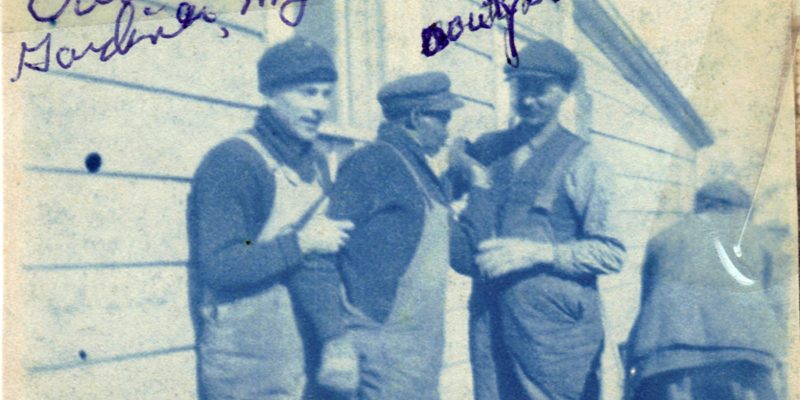
The fall issue of The Gardiner Gazette reported on the old house at the corner of Steve’s Lane and Dusinberre Road, acquired by the Town of Gardiner in a tax sale in 2009. When the title clears the Town will have to decide what to do with the house. The following article was submitted by Marc Fried and is a revised, shortened version of an article that appeared in the Ellenville Journal (now the Shawangunk Journal) on Nov. 29, 2007. It is reprinted with permission.
In the summer of 1960 I worked full time on Dick Borcherding’s dairy farm on Phillies Bridge Road. I was 16, and the only other hired hand, a part-timer, was a small, wiry man of 68 named Asa Barton. “Acey” was a bachelor, who lived in the small, old house at the intersection of Dusinberre and Steve’s Lane.
Acey was a hunchback. As I later learned, he’d developed this condition at the age of 15, not long after falling out of a tree next to McKinstry’s general store in Gardiner (now Hi-Ho Home Market & Antique Center), a tree he’d climbed while showing off to some girls. To the end of his days he reportedly believed the fall had been the cause of his disfigurement, though I’m informed by a physician that the timing was probably entirely coincidental. In his younger years, Acey was manager of the creamery in Gardiner. It was his best and most important job, and it was a job and time to which he often referred.
Working together, we took in the hay, dug quack grass out of Dick’s vegetable garden and labored with scythes or “bush hooks,” keeping briars and saplings in check along the stone walls and fence rows that bordered the fields and pastures of Dick’s farm. Once, while working far from the house, we uncovered a small concrete monument marking the route of the old 1910 Catskill Aqueduct, a project Acey had worked on while still in his teens. When we returned from the fields with a wagon load of hay, I’d climb up into the haymow while Acey tossed the bails, one at a time, onto the elevator, pausing till I’d returned from stowing the previous bail. It was about 120° in that mow, and the task usually came near the end of a summer afternoon. Lifting that Last Bail off the wagon, he would sometimes exclaim, “I was lookin’ for this one, and it took me the whole pile before I finally found it!”
Dick didn’t quite trust Acey to drive the farm tractor, especially as the Wallkill Valley Railroad ran through the property, though trains came through only twice a day. “I guess he’s afraid I’ll exceed the speed limit,” I remember Acey lamenting. But even that much of a complaint was rare. Acey was a good-natured man, a country rustic who’d last been down to New York City some 40 years earlier. He would occasionally quote the words of some American folk hero: “America loves a humbug” I recall him saying, words he attributed to P. T. Barnum, who he told me once charged people a nickel to see “a vehicle able to travel without benefit of beast or steam power.” The nickel rewarded the gullible with a view of a wheelbarrow.
Down in the ten-acre lot across the railroad track, one day early in the summer, something must have reminded Acey of a doggerel he had gleaned from an old cylinder-type recording, played on a hand-cranked Victrola he still possessed. We paused from work and he recited the poem from memory. It was too long for me to memorize on the spot, but I always remembered the gist of the story it told, as well as the first and last line (which was the story’s punchline). And I always regretted that I’d never prevailed upon Acey to repeat it slowly so I could write down the words. The years passed. Acey passed away. In my twenties and early thirties, I would stop by the farm now and then to visit Dick (by then retired) and chew the fat. Dick passed away in 1979. More years passed. In 1998, chatting with my neighbor about the olden days, I learned to my surprise that he knew Acey Barton. Or did he? The man he knew lived in the very same house, but my neighbor was quite certain he was still alive. We finally figured out the individual in question was the nephew of the Acey I had known. Not long afterward, I stopped by the house and knocked. A man in his late 70s finally came to the door. “Are you Acey Barton?” I inquired. “Well, I might be,” he said, with a hint of a cautious smile. Here was I, practically a youngster by comparison, and my next words must have been very unexpected: “I was a friend of your uncle.”
We had a nice talk of half an hour’s duration and finally I asked him about the old hand-cranked record player and cylinder recordings. Was that something he still had in the house? “No, all that stuff was given away or gotten rid of after my uncle died,” he said. Driving home, I realized that now I would never be able to recover the words to that poem. And then it dawned on me that I had all the information I needed to rewrite the poem myself.
The County Deed Record shows Acey had acquired the house and property in 1918, and deeded it to his nephew in 1967, which I believe was shortly before he died. I do hope the Town of Gardiner decides to preserve and restore the Acey Barton House. If so, and if there’s some sort of ribbon-cutting, I could probably be talked into reciting what I call “Acey’s Poem” to those assembled!
